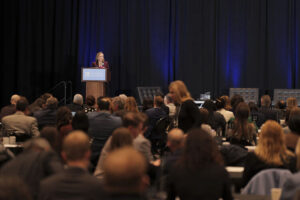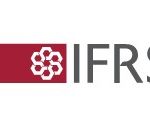
The IFRS Sustainability Symposium 2025 was held on 30 October in London, bringing together preparers, and investors alongside other global market leaders from 48 jurisdictions to discuss the implementation of ISSB Standards.
Building on the success of 2024, this year’s theme, ‘Pathways to Adoption’ focused on practical experiences with regulatory and voluntary application of the ISSB Standards.
Here are five key takeaways from the discussions:
1. ISSB Standards are becoming the global passport for companies to meet sustainability disclosure regulations
Nearly 40 jurisdictions accounting for almost 60% of global GDP are adopting or otherwise using the ISSB Standards. Jurisdictions are increasingly recognising the value of adopting the ISSB’s sustainability-related disclosure requirements, connecting local markets to global capital pools and investors seeking new opportunities.
While welcoming this momentum, ISSB Chair, Emmanuel Faber, articulated the need to address potential cross-border issues to ensure the introduction of ISSB Standards can truly benefit capital markets.
As such, he announced the expansion of the Jurisdictional Working Group, now renamed the Jurisdictional Adopters Working Group, as a mechanism to facilitate discussions among regulators to support the ISSB Standards’ role as a global passport for sustainability reporting.
A new Jurisdictional Rationale Guide for the adoption or other use of ISSB Standards and accompanying tool, unveiled at the Symposium, explore jurisdictions’ experiences of and motivations for using the ISSB Standards. The ISSB works closely with policymakers and regulators to support adoption, enhance compatibility, improve reporting efficiency and raise the quality of disclosures.
2. The EU Omnibus provides an opportunity to further align ESRS with ISSB Standards
Many companies will need or choose to report sustainability-related financial information using both the ISSB Standards and the European Sustainability Reporting Standards (ESRS).
The ISSB Standards are being introduced globally to enable companies to meet the information needs of investors. ESRS go beyond the information needs of investors to elicit broader sustainability information.
Recognising the importance of supporting an efficient disclosure regime, joint work is being done by the ISSB and EFRAG to secure interoperability and to help companies avoid duplication in reporting.
Now, as EFRAG simplifies ESRS as part of the European Commission’s Omnibus Package, efforts are ongoing to retain and improve where possible the high degree of alignment between ISSB Standards and the revised ESRS.
ISSB Vice-Chair, Sue Lloyd, reflected that it is important to ensure that those applying both ISSB Standards and ESRS are able to do so efficiently, so interoperability is important. But as jurisdictions around the world move forward with the adoption or other use of the ISSB Standards, companies are also considering how ISSB Standards can serve as a global passport in the context of compliance with the Corporate Sustainability Reporting Directive. Enabling companies to use ISSB Standards as a starting point and ‘top up’ with specific impact disclosures to achieve compliance with ESRS would be the most efficient way to support companies and deliver comparability for investors.
EFRAG Sustainability Reporting Board Chair, Patrick de Cambourg, reflected on the importance of collaboration between EFRAG and the ISSB as work develops and shared insights into EFRAG’s efforts to simplify ESRS and respond to requests for guidance and training.
3. International standards enable a level playing field for companies
Speakers emphasised that the introduction of the global baseline enables companies to gain a competitive edge through the preparation of high-quality sustainability disclosures. Globally recognised standards bring comparability to sustainability disclosures, replacing the previous patchwork of voluntary frameworks.
The ISSB Standards include proportionality and transition relief mechanisms that support companies of all sizes to apply the Standards at a manageable pace, while continuing to provide decision-useful information to investors.
By establishing a global baseline that is used by jurisdictional regulators and policymakers, the ISSB Standards allow companies to use sustainability-related financial disclosures as a powerful tool to provide strategic insights to investors globally.
4. Quality is more important than quantity
Sustainability disclosures are most useful to investors when they tell a clear and coherent story of value creation.
Investors want to receive material, high-quality information that reflects what is driving decision-making within a company.
We heard time and time again that sustainability disclosure shouldn’t be a box-ticking exercise. It’s about communicating how the company is navigating sustainability-related risks and opportunities to drive growth over the short, medium and long term.
5. Strong market demand for industry-specific disclosures
Speakers highlighted that industry-specific disclosures are decision-useful for both investors and corporate management. These disclosures enable investors to understand the unique risks and opportunities tied to the company’s business activities through an industry-specific lens, assessing performance against industry benchmarks or comparing across industries. Corporate leadership also benefit from a robust data governance framework that equips boards and executives with the information needed to make data-driven and strategic decisions.
SASB Standards are integral for companies applying the ISSB Standards, providing guidance for industry-specific disclosures.
The ISSB is committed to maintaining and enhancing the SASB Standards to ensure they remain relevant and fit for use by regulators and companies.
The ISSB is currently seeking feedback on enhancements to nine SASB Standards, and consequential amendments to the ISSB’s industry-based guidance for IFRS S2.
Participants heard how market input to SASB Standards enhancement—the comment period is open until 30 November 2025— will also help shape the ISSB’s research projects on nature (Biodiversity, Ecosystems and Ecosystem Services) and human capital.



